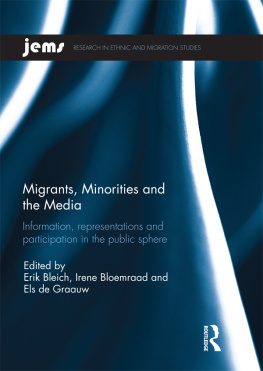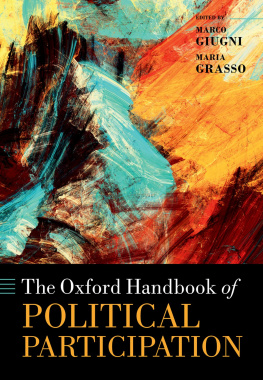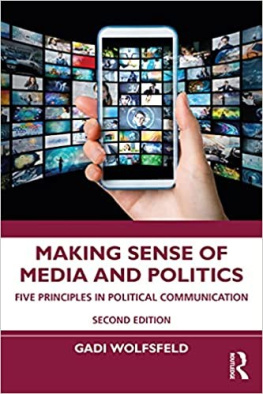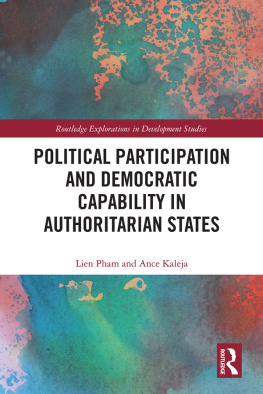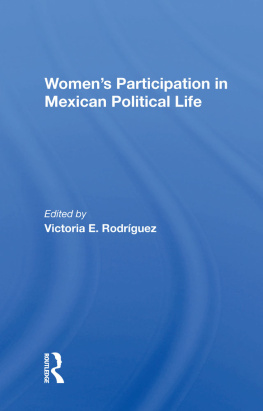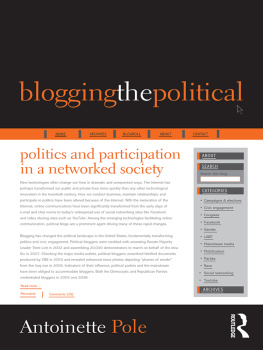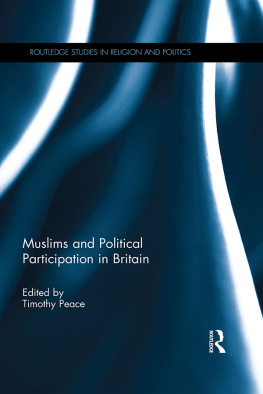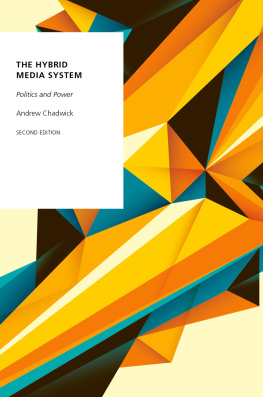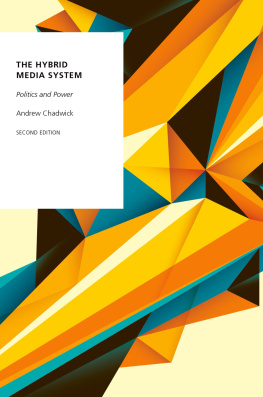Hybrid Politics
Hybrid Politics
Media and Participation
SAGE Publications Ltd
1 Olivers Yard
55 City Road
London EC1Y 1SP
SAGE Publications Inc.
2455 Teller Road
Thousand Oaks, California 91320
SAGE Publications India Pvt Ltd
B 1/I 1 Mohan Cooperative Industrial Area
Mathura Road
New Delhi 110 044
SAGE Publications Asia-Pacific Pte Ltd
3 Church Street
#10-04 Samsung Hub
Singapore 049483
Laura Iannelli 2016
First published 2016
Apart from any fair dealing for the purposes of research or private study, or criticism or review, as permitted under the Copyright, Designs and Patents Act, 1988, this publication may be reproduced, stored or transmitted in any form, or by any means, only with the prior permission in writing of the publishers, or in the case of reprographic reproduction, in accordance with the terms of licences issued by the Copyright Licensing Agency. Enquiries concerning reproduction outside those terms should be sent to the publishers.
Library of Congress Control Number: 2016944802
British Library Cataloguing in Publication data
A catalogue record for this book is available from the British Library
ISBN 978-1-4739-1578-7
eISBN 978-1-4739-1771-2
Editor: Natalie Aguilera
Editorial assistant: Delayna Spencer
Production editor: Vanessa Harwood
Marketing manager: Sally Ransom
Cover design: Jen Crisp
Typeset by: C&M Digitals (P) Ltd, Chennai, India
Printed and bound by CPI Group (UK) Ltd, Croydon, CR0 4YY
Hybrid Politics covers the modern history of media and publics, from the mass media era to the age of social media. This comprehensive review of research in the field makes for a valuable sourcebook. Iannellis discussion of the changing relationships between citizens and media points out the need for new models to explain emerging forms of politics.
Lance Bennett, University of Washington
This scholarly book brings together concerns for political activism, democracy, new [and old] media and changing cultural practices. It makes an invaluable contribution to multidisciplinary social science thinking about ways in which our world is moving. Iannellis case studies especially those from outside the US and UK offer much needed illumination and understanding.
Frank Webster, City University London
Iannelli provides us with an insightful theorization and valuable resource for understanding the increasingly vital role played by communication in contemporary democratic politics.
Brian Loader, University of York
Hybrid Politics is a thorough, theoretically rich and pointed analytical intervention into the crowded terrain of participation research spanning media and communication studies, political science and sociology. The book achieves two very important goals. It assembles a minute chronology of media hybridity culminating with aspirations for democratic participation in their workings [and] at the same time, Laura Iannelli is able to navigate a very complex theoretical landscape to produce a truly interdisciplinary reading of intersecting media and the political, economic and social relations at their heart.
Dan Mercea, City University London
From the Occupy Movement in the US to The Island of Redundant Workers in Sardinia, Iannelli draws a powerful picture of contemporary instances of unconventional political participation where different media ecologies play an undisputed role. With its innovative take on hybrid politics, this volume successfully tackles the challenge to talk about politics, communication and the media with a fine-grained, interdisciplinary and theoretically-driven approach. Hybrid Politics is a remarkable work that provides a needed contribution to the study of political participation in contemporary democracies.
Stefania Vicari, University of Leicester
About the Author
Laura Iannelliis Lecturer in Sociology of Culture and Communication. She received her PhD in Theory and Social Research from Sapienza University in Rome. Since 2011 she has been teaching Political Communication and Participation at the University of Sassari in Sardinia (Italy). Her primary research focuses on communication processes and political participation. In 2013 she began coordinating a two-year multidisciplinary research project on activism, performative citizenship, and contemporary public art, funded by the Region of Sardinia. In 2015, in collaboration with City University London, she organised an international conference entitled Protest Participation in Variable Communication Ecologies in Alghero (Italy), and co-edited special issues on this topic in the journals
Information, Communication & Society and
Social Media + Society. She has published various book chapters and scientific articles on media and political participation, and in 2010 authored the book
Facebook & Co. Sociologia dei Social Network Sites (Milan: Guerini Scientifica).
Introduction
The relationship between media and participation is a central theme in the debate regarding the quality of democracy. An essential ingredient in those works in progress that are democratic regimes is indeed the participation of citizens in the decision-making processes orientated towards influencing political systems in direct or indirect ways. And, the media plays a central role in the participation of citizens within the sphere of politics. In fact, political communication research and social movement studies have demonstrated, since the last century, that the media has the power to shape knowledge, opinion, and information about the diverse actors in a political system, thus influencing the institutional and unconventional repertories of political action.
The media holds import in democracy, then, insofar as its symbolic production bears on the strategies of participation within the sphere of institutionalised and protest politics. And yet participation within the sphere of media itself matters for democracy too.
Indeed, the media sphere is a societal realm wherein diverse forms of power imbalance develop, related to the construction of dominant representations, the ownership of the technologies that contribute to rendering reality, and the control of the norms that regulate the practices of the production of symbolic forms (Shiller, 1989; Castells, 1996, 2009; McChesney, 2008; Couldry, 2012). Participation within the media sphere enhances the democratic character of societies insofar as it contributes to remedy the power imbalances in the production of hegemonic discourses, in the control of the means of production of symbolic forms, and in the definition of the norms of cultural production and circulation as shown since the last century by research into public spheres, active audiences, and alternative media. Participation within the media sphere can be understood as political in and of itself insofar as it contributes to the democratisation of democracy (Giddens, 2002: 93), in so much as it democratises more decentralised decision-making processes which are not restricted to formal politics (Carpentier, 2011a, 2011b).


